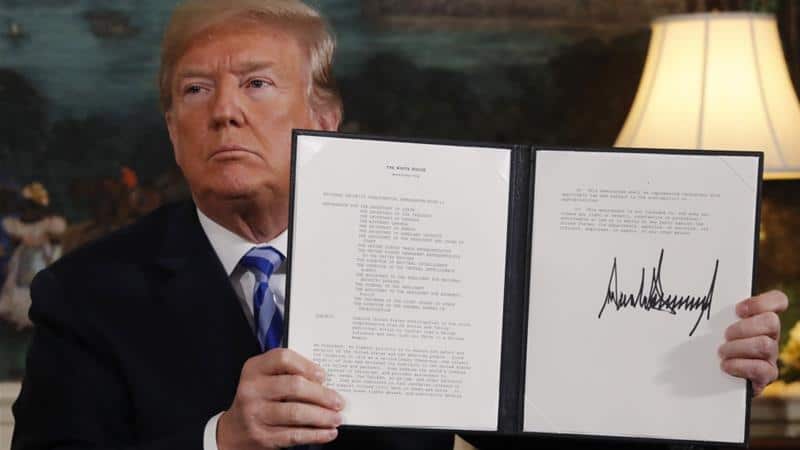Nearly two years ago, US President Donald Trump announced the US would withdraw from the Joint Comprehensive Plan of Action (JCPOA), the official name of the “Iran Nuclear Deal.” Two years on, the US is trying to argue it is still a participant in the agreement. Members of the agreement can call for a “snapback,” which would reinstate all UN sanctions on Iran.
Participants to the agreement hold the power to reinstate sanctions, and as an arms embargo on Iran is set to expire in October, the US is using its position as an original signatory to in order to extend the embargo. According to an analysis by the Arms Control Association, the JCPOA says “any party can go to the UN Security Council to put sanctions back in place if there is noncompliance.”
Rights and obligations
The US is claiming signatory rights that come with the agreement. US Secretary of State Mike Pompeo said that “the rights that accrue to participants in the U.N. Security Council resolution are fully available to all those participants.” The US claiming the rights of a participant has offended Russian diplomats as Pompeo had called the agreement “the worst deal ever” when the US withdrew.
Russian diplomats have scoffed at the idea that the US even qualifies as a “party” after Trump abandoned the Obama-era agreement and reinstated sanctions on Iran that the deal had intended to lift. The agreement was intended to prevent any Iranian ambitions towards developing nuclear weapons in a return for increased economic cooperation and a lifting of UN sanctions.
International friction
The deal took years to negotiate and was lauded as a major breakthrough in global geopolitics upon its signing. President Trump, however, made the agreement a central part of his 2016 presidential campaign. With much bombast the US abandoned the deal and tried to pressure others into similarly exiting the agreement.
Bloomberg media’s Bobby Ghosh called the US stance “empty chest-thumping” as traditional US allies are increasingly exasperated by the Trump administration’s pressure and belligerence. The US is insisting its former co-signatories renew an expiring weapons embargo, even while many nations are calling for sanctions relief in the face of Iran’s devastating COVID-19 outbreak.
Crumbling agreement
The move by US diplomats comes at a time when the JCPOA is an agreement in name only. The EU failed to provide the economic benefits Iran had expected. After the United States reinstated sanctions, many international companies have been reluctant to do business with Iran in fear of angering the US state department.
The EU had tried to establish the INSTEX scheme for companies to “safely” trade with Iran through an exchange mechanism, but the program never produced results even close to the economic benefits Iran had been promised. In response, the Iranian government reported it would increase nuclear enrichment but the Institute for Science and International Security has called this a “bluff.” With both sides of the agreement in non-compliance, its future remains uncertain as the US continues its “maximum pressure” campaign.
Weapons embargo likely to expire
Vassily Nebenzia, Russia’s ambassador to the UN, called the move “ridiculous,” saying “they are not members, they have no right to trigger” a snapback, according to Reuters. Nebenzia feared that the intended reinstatement of UN sanctions would mean the end of the JCPOA. The ambassador highlighted the tight monitoring of Iran’s nuclear activities by the International Atomic Energy Agency, which would cease should the deal collapse.
“Snapback will definitely be the end of the JCPOA … The most intrusive inspections of a country by the IAEA will cease. Is it in the U.S. interests that it happens?” Nebenzia posed.
Reinstating sanctions outside of the deal’s snapback protocol would be difficult, as would the extension of the weapons embargo on Iran. A resolution to do either would need to pass the Security Council without a veto by Britain, China, France, or Russia.
Reuters asked the Russian ambassador whether a Russian veto is to be expected. Nebenzia replied, “I never answer questions before the right time comes, but you may make a wild guess.”
Read also: Russian Oil Output Drops to Decade-Low as Oil Glut Eases

